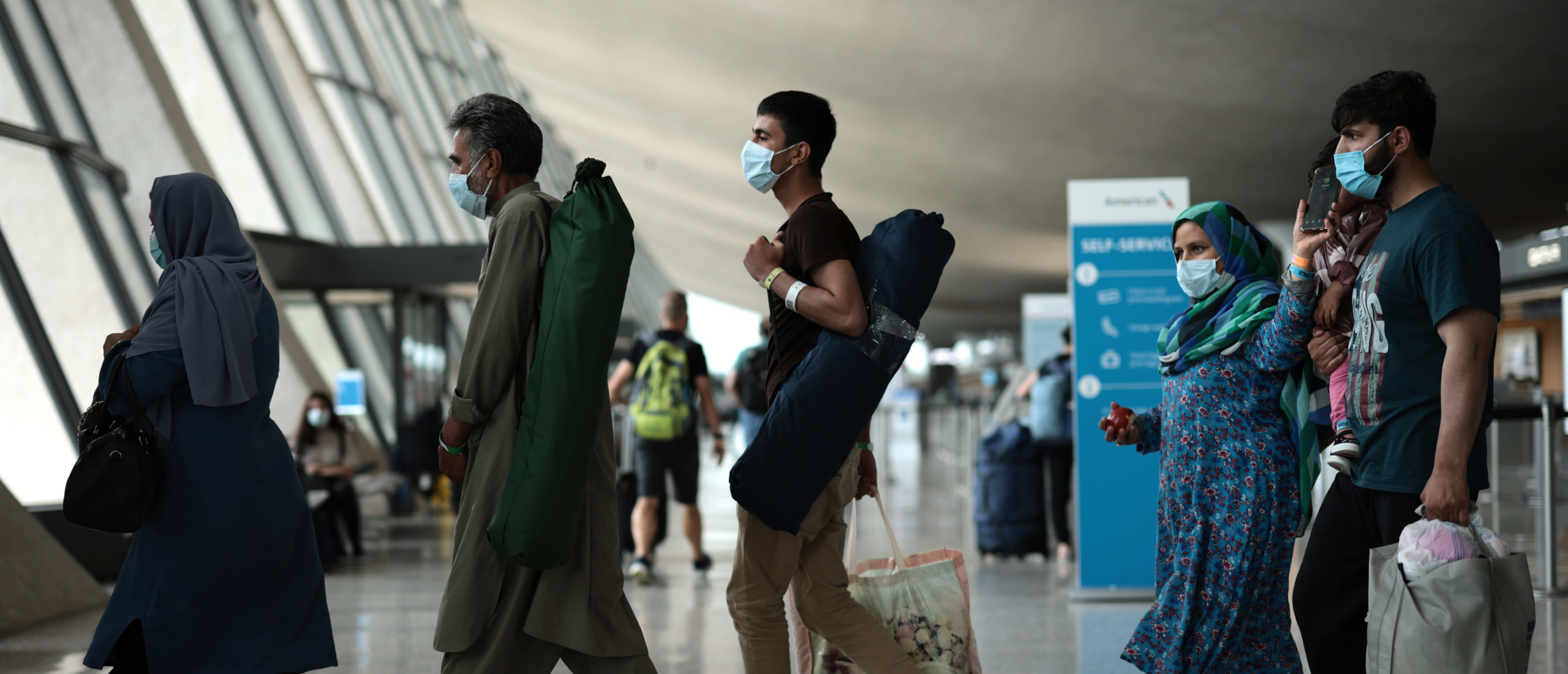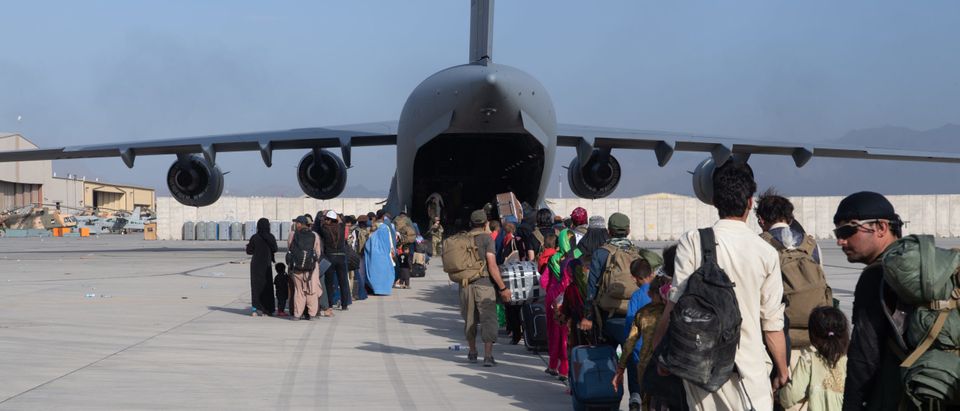- The Department of Homeland Security (DHS) lacked the information to fully vet some Afghan evacuees during the chaotic U.S. withdrawal from the country in August 2021, the office of the inspector general (OIG) reported.
- “DHS and CBP cannot be sure they properly screened, vetted, and inspected all evacuees,” OIG stated in its report.
- Thousands of individuals lacked proper biographical information and some were still allowed into the country, including some with “derogatory information,” according to the report.
The Department of Homeland Security (DHS) failed to “properly” vet Afghans deemed a “risk to national security” who were evacuated during the Afghanistan withdrawal in August 2021, a government watchdog report concluded Tuesday.
The DHS Inspector General found that U.S. Customs and Border Protection (CBP) didn’t have evacuees’ biographical data to properly screen them through government databases, and, in some instances, had inaccurate information on some evacuees. The U.S. accepted over 79,000 Afghan evacuees between July 2021 and January 2022 as the Taliban took control of the country. (RELATED: US Government Left As Many As 9,000 American Citizens In Afghanistan After Withdrawal, Senate Report Reveals)
U.S. troops left Afghanistan on Aug. 30, 2021 after President Joe Biden ordered a full withdrawal, ushering in Taliban control of the capital. During the evacuation, an explosion killed 13 Marines who were supporting the effort.
“The safety and the security of the American people is the highest priority for the U.S. Government,” the report stated.
“Preventing criminals, suspected terrorists, or other nefarious actors from entering the United States requires thorough screening and vetting. CBP’s use of incomplete or inaccurate data would not have yielded positive matches from intelligence databases if the individuals had derogatory records under a different name or DOB,” the report stated. “Therefore, DHS and CBP cannot be sure they properly screened, vetted, and inspected all evacuees. We found they paroled at least two individuals into the United States who may have posed a risk to national security and the safety of local communities and may have admitted or paroled more individuals of concern.”
The inspector general found that names, birth dates, identification number and travel document data that were processed through U.S. government databases were “inaccurate, incomplete, or missing.” Additionally, CBP allowed evacuees into the country who weren’t fully vetted, the report found.
The vulnerability allowed at least two individuals into the U.S. that posed a security risk, according to the report.
CBP also processed evacuees with “questionable names and dates of birth,” forcing U.S. officials to take evacuees at their word, according to the report. The issue can largely be attributed to the culture in Afghanistan, where some people have only one name and where it isn’t customary to know or record one’s birth date.
The report found that 417 records had unknown first names, 242 had unknown last names and 11,110 had Jan. 1 as their birth dates, which is typically assigned when an actual date can’t be provided by the evacuee, the report found.
There were also 36,400 records where evacuees used “facilitation document” that CBP couldn’t explain that might’ve have incorrect information, according to the watchdog. Another 7,800 records had “invalid or missing document numbers.”

DULLES, VIRGINIA – AUGUST 31: Refugees walk through the departure terminal to a bus at Dulles International Airport after being evacuated from Kabul following the Taliban takeover of Afghanistan on August 31, 2021 in Dulles, Virginia. The Department of Defense announced yesterday that the U.S. military had completed its withdrawal from Afghanistan, ending 20 years of war. (Photo by Anna Moneymaker/Getty Images)
CBP allowed 35 Afghans to fly to the U.S. without proper clearance and failed to collect the fingerprints of 1,299 evacuees before they came to the U.S., according to the report.
“We attribute DHS’ challenges to not having: (1) a list of Afghan evacuees who were unable to provide sufficient identification documents; (2) a contingency plan to support similar emergency situations; and (3) standardized policies. As a result, DHS may have admitted or paroled individuals into the United States who pose a risk to national security and the safety of local communities,” the watchdog noted.
The White House, however, said that the report failed to include steps it took in ensuring Afghans were vetted.
“That very report did not take into account the key steps in that rigorous and multi-layered screening and vetting process the U.S. government took before at risk Afghans were permitted to come to the U.S.,” White House Press Secretary Karine Jean-Pierre told reporters Wednesday, adding that DHS “disputed this report.”
DHS echoed Jeane-Pierre’s comments, telling the DCNF that the report doesn’t correctly account for the full parole process.
“As with other foreign nationals in the United States, Afghan nationals in the United States undergo continuous vetting, known as recurrent vetting, to ensure the continued protection of public safety and national security,” a DHS spokesperson told the DCNF. “If derogatory information, whether related to public safety or national security, becomes available after an individual enters the United States, DHS and our federal partners take appropriate action, such as opening a criminal investigation, commencing a prosecution, revoking parole, and/or placing the individual in removal proceedings.
“The rigorous and multi-layered screening and vetting process established by the U.S. government begins overseas and is conducted by intelligence, law enforcement, and counterterrorism officials from across the U.S. Government – including from the Departments of Defense, Homeland Security, and State; Federal Bureau of Investigation; National Counterterrorism Center; and other Intelligence Community partners – for all Afghan nationals arriving in the United States through OAW. Afghan nationals who did not clear these checks were not permitted to travel to the United States as part of OAW,” the spokesperson added.
This story has been updated to include a statement from the Department of Homeland Security.
All content created by the Daily Caller News Foundation, an independent and nonpartisan newswire service, is available without charge to any legitimate news publisher that can provide a large audience. All republished articles must include our logo, our reporter’s byline and their DCNF affiliation. For any questions about our guidelines or partnering with us, please contact licensing@dailycallernewsfoundation.org.


